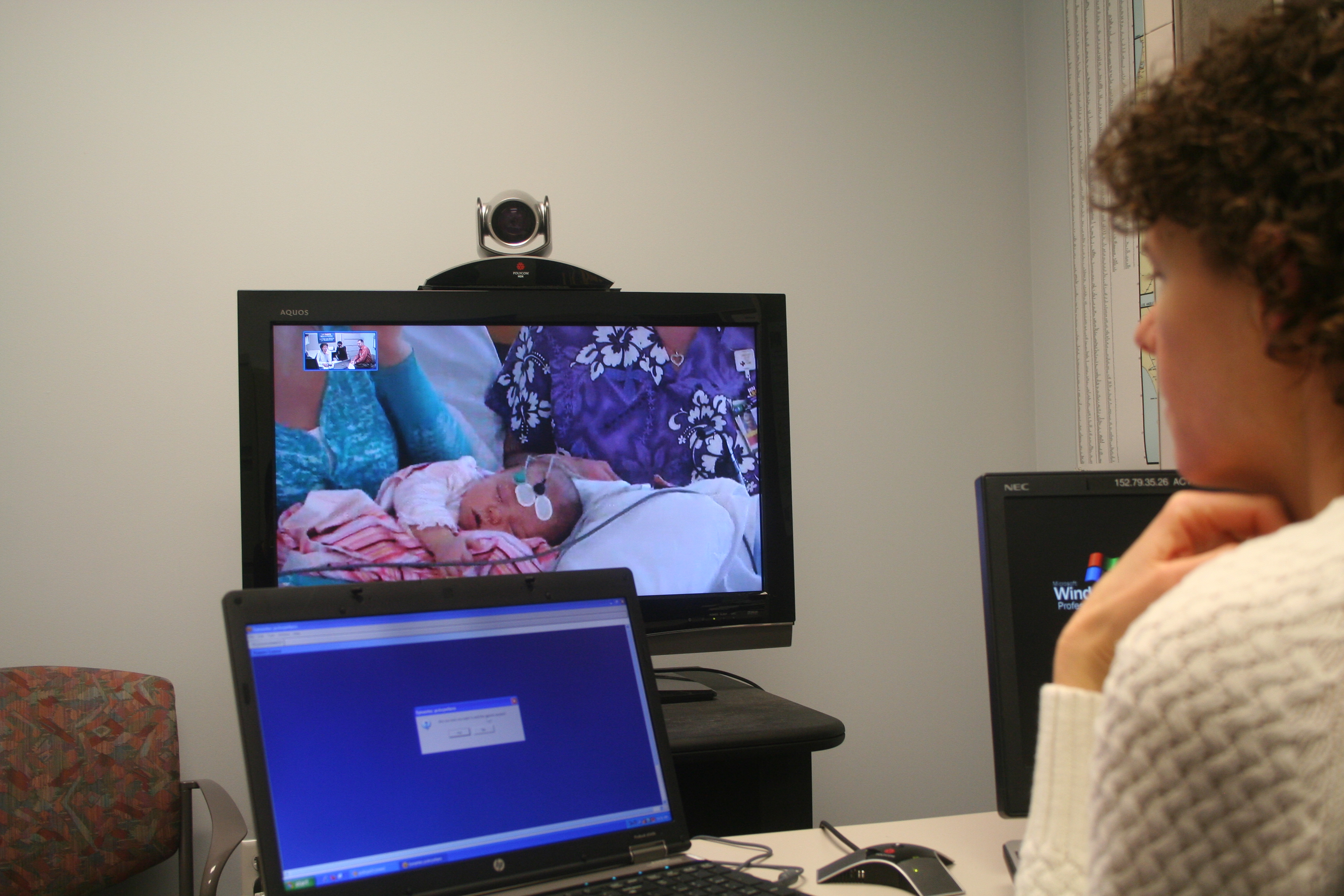

Grace Lee, five weeks old, swaddled in a pink-striped blanket, dozes in her mother’s arms in a room at a hospital in Redding. The baby failed two hearing tests in her first two days of life, and a follow-up exam a week later suggested trouble in one ear.
Evaluating her hearing loss within the first three months of her life was essential. If follow-up tests indicated a permanent problem, she’d need to be fitted with a hearing aid to have the best chance of developing unimpaired speech and other important skills later in life.
Grace needed a pediatric audiologist to do the tests. But her family lives in the wide swath of California north of Sacramento, where pediatric audiologists – and pediatric specialists generally – are hard to find.
So instead of being examined in her room at Mercy Hospital in Redding, Grace was beamed into an office at UC Davis Medical Center in Sacramento via videoconferencing.
UC Davis has a well-established telemedicine program, where specialists consult with doctors in remote or underserved locations. The numbers suggest that the need for specialists to test kids’ hearing is acute in the far north of California. Depending on the year, anywhere between 20 and 40 percent of children in that region who don’s pass the newborn screen don’t return for follow-up tests and treatment, according to Anne Simon, pediatric audiologist at UC Davis Medical Center.
The pediatric audiology telemedicine program has seen all seven of its patients this year remotely, but the visit went far beyond the typical consult. Simon wasn’t giving advice – she was performing tests herself.
Technicians Dawn Deines and Debbie Nickell acted as Simon’s hands in Redding, attaching electrodes to Grace’s head and inserting a probe into her ear as she slept on her mother’s lap. Data from the probes and wires streamed to Simon’s laptop screen.
“It doesn’t hurt,” Simon assured Jessica, Grace’s mother, as Deines and Nickell gently scrubbed the baby’s scalp before attaching electrodes to her head.
The setup has its challenges. Simple tests are harder over a video monitor. A basic examination of the outside of Grace’s ear took several readjustments of the digital camera, and Simon still wasn’t able to get as good a look as she’d like. Looking inside a baby’s ear with an otoscope is harder over a video feed too, she said.
“Audiologists by nature are very controlling,” Simon said. “It’s a little tiny baby and I want it to be done right.”
Comforting the parents is another part of the job that’s harder to do over video, Simon said. “It’s really important that mom knows she has a wonderful baby no matter how the test goes.”
Though the distance makes the exam more challenging for the audiologist, the telecommute makes life much easier for parents who live in the far north of California. A drive of seven hours round trip with an infant to see an audiologist, which for many families would also mean an overnight stay and a day or two off of work, made the follow-up appointment too difficult, Simon said.
“It’s just difficult for them to have to drive three or four hours to see an audiologist,” said James Marcin, professor of pediatric critical care medicine and director of the UC Davis Health System Pediatric Telemedicine Program. Rural areas can’t typically support specialized care providers like Simon, Marcin said.
The cost of missing the window for early intervention are huge, Marcin said, both for hearing impaired children and their families as well as to taxpayers.
“For each kids that you are able to intervene in early, you will save 1.4 million in lost wages and health effects like anxiety, depression, diabetes and heart disease. Our goal is to miss no one,” Marcin said.
The pediatric telemedicine program expects to see 60 babies for hearing evaluations this year.






You must be logged in to post a comment.